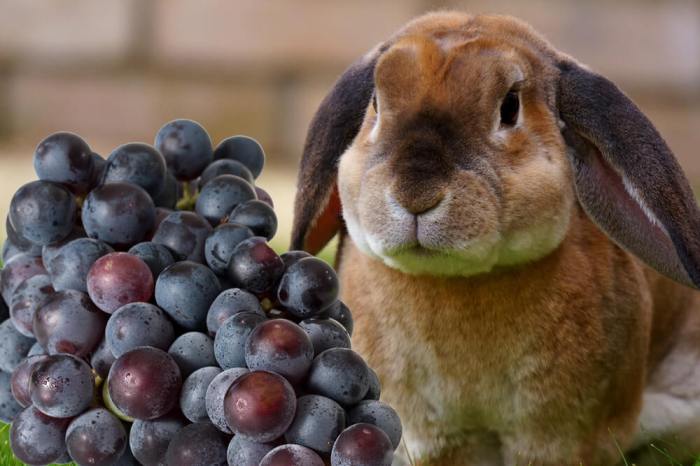Grapes are a delicious and nutritious fruit that is enjoyed by humans and animals alike. But can rabbits eat grapes? The answer is yes, but there are some important things to keep in mind.
In this guide, we will discuss the nutritional value of grapes, how to safely feed grapes to rabbits, the potential risks of grape consumption, and some alternatives to grapes that are safe for rabbits.
Nutritional Value of Grapes

Grapes are a healthy and nutritious fruit that can provide rabbits with essential vitamins and minerals. One serving of grapes (about 1 cup) contains the following nutrients:
- Calories: 62
- Carbohydrates: 16 grams
- Protein: 1 gram
- Fiber: 1 gram
- Vitamin C: 14% of the Daily Value (DV)
- Potassium: 10% of the DV
- Manganese: 5% of the DV
Grapes are also a good source of antioxidants, which can help protect rabbits from damage caused by free radicals. Free radicals are unstable molecules that can damage cells and lead to a variety of health problems, including cancer and heart disease.
Sugar Content in Grapes
Grapes do contain sugar, but it is naturally occurring sugar. One serving of grapes contains about 15 grams of sugar. This is a moderate amount of sugar, and it is not likely to cause problems for rabbits if they are fed grapes in moderation.
However, it is important to note that rabbits should not be fed too many grapes. Too much sugar can lead to weight gain and other health problems. Rabbits should only be given grapes as a treat, and they should not make up more than 10% of their diet.
Safe Consumption of Grapes
Grapes can be a safe and healthy treat for rabbits when given in moderation and prepared correctly.
Recommended Portion Size
The recommended portion size of grapes for rabbits is 1-2 grapes per 2 pounds of body weight per week.
Preparation
To prepare grapes for safe consumption by rabbits, wash them thoroughly and remove any seeds or stems. Cut the grapes into small pieces to prevent choking.
Frequency of Consumption
Rabbits should not be given grapes more than once or twice a week. Overconsumption can lead to digestive issues such as diarrhea.
Potential Risks of Grape Consumption
While grapes can be a treat for rabbits, it is important to be aware of the potential risks associated with their consumption.
Grapes contain high levels of sugar, which can lead to digestive issues in rabbits. Rabbits have sensitive digestive systems, and too much sugar can cause diarrhea, bloating, and gas. In severe cases, digestive issues can lead to dehydration and even death.
Grape Seeds
Grape seeds are toxic to rabbits. They contain a compound called amygdalin, which can release cyanide when ingested. Cyanide is a poisonous substance that can damage the rabbit’s liver, kidneys, and nervous system. Even a small amount of cyanide can be fatal to a rabbit.
Allergic Reactions
Some rabbits may be allergic to grapes. Symptoms of an allergic reaction can include hives, swelling, difficulty breathing, and anaphylaxis. If you think your rabbit is having an allergic reaction to grapes, seek veterinary attention immediately.
Alternatives to Grapes
While grapes can be a healthy treat for rabbits in moderation, there are other fruits and vegetables that are equally nutritious and safe for your furry friend. These alternatives offer a variety of flavors and nutritional benefits, ensuring a balanced and varied diet for your rabbit.
When choosing alternatives to grapes, consider their nutritional content, frequency of consumption, and appropriate portion sizes. Here are some excellent options to explore:
Apples
- Nutritional Value: Apples are a good source of vitamin C, fiber, and antioxidants.
- Benefits: Vitamin C supports a healthy immune system, while fiber aids in digestion. Antioxidants help protect cells from damage.
- Frequency and Portion Size: Offer small slices of apple no more than once a week due to their high sugar content.
Blueberries
- Nutritional Value: Blueberries are rich in antioxidants, vitamins C and K, and fiber.
- Benefits: Antioxidants protect cells from damage, vitamin C supports immunity, and vitamin K aids in blood clotting. Fiber promotes healthy digestion.
- Frequency and Portion Size: Blueberries can be given as a treat a few times a week, with a portion size of about a tablespoon.
Bananas
- Nutritional Value: Bananas are a good source of potassium, vitamin C, and fiber.
- Benefits: Potassium supports heart health, vitamin C strengthens the immune system, and fiber aids in digestion.
- Frequency and Portion Size: Bananas should be given sparingly due to their high sugar content. A small slice once or twice a month is sufficient.
Conclusion
As a general rule of thumb, it is best to feed grapes to rabbits in moderation. A few grapes once or twice a week is a safe and healthy treat for most rabbits.
If you have any concerns about feeding grapes to your rabbit, be sure to talk to your veterinarian.
FAQ Summary
How many grapes can I give my rabbit?
A few grapes once or twice a week is a safe and healthy treat for most rabbits.
Can rabbits eat grape seeds?
No, rabbits should not eat grape seeds. Grape seeds contain a toxin that can be harmful to rabbits.
Can rabbits eat grapes with skin?
Yes, rabbits can eat grapes with skin. However, it is important to wash the grapes thoroughly before giving them to your rabbit.
What are some alternatives to grapes for rabbits?
Some alternatives to grapes for rabbits include apples, bananas, blueberries, and carrots.